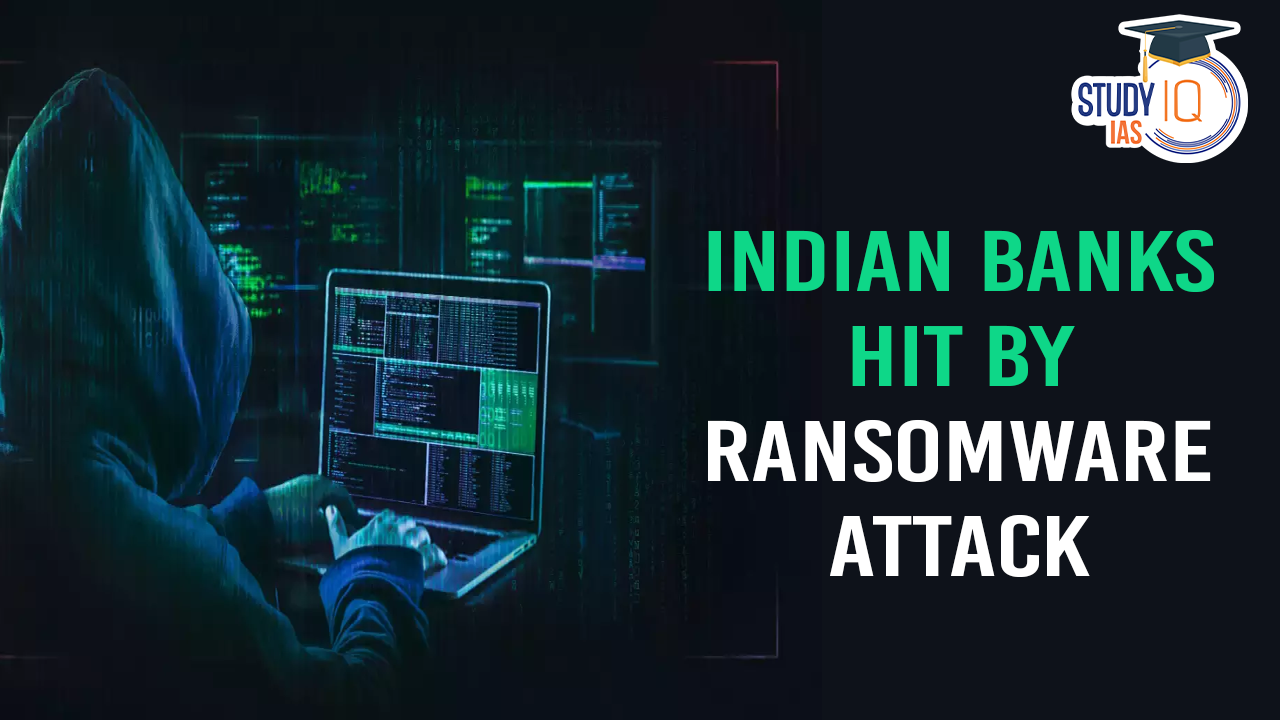Table of Contents
A significant ransomware attack has recently impacted the Indian banking sector, affecting nearly 300 small cooperative and regional rural banks. This incident, involving the technology service provider C-Edge Technologies, has caused disruptions in retail payment systems and has been widely reported in the media. For UPSC aspirants, understanding the implications of such cyberattacks is crucial, not only for the examination but also for comprehending their impact on national security and economic stability.
Background of Ransomware Attack
On July 31, 2024, it was revealed that C-Edge Technologies, a Mumbai-based technology provider supporting a large network of cooperative and regional rural banks, was hit by a ransomware attack. The attack led to a temporary shutdown of payment systems across nearly 300 banks, primarily affecting small institutions outside major cities. The National Payments Corporation of India (NPCI) swiftly responded by isolating the affected systems to mitigate further damage.
Ransomware Attack on Service Provider Hits Payment Systems of 300 Indian Banks
Ransomware is a type of malicious software that encrypts data on a victim’s system, rendering it inaccessible until a ransom is paid. In this case, the ransomware targeted C-Edge Technologies, affecting its ability to facilitate payment processing for the banks it services. The NPCI’s response included temporarily halting all retail payments and isolating the compromised systems from the broader payment network to contain the breach.
Impact on the Banking Sector
The immediate impact of the attack was significant:
- Disruption of Payment Systems: Customers of the affected banks faced interruptions in services, particularly in UPI (Unified Payments Interface) and Aadhaar-enabled Payment Systems (AePS). However, traditional cash arrangements remained largely unaffected.
- Financial and Operational Repercussions: The disruption impacted approximately 200 cooperative banks and regional rural banks. These institutions, which are crucial for providing financial services in rural and semi-urban areas, faced operational difficulties, affecting their ability to conduct transactions and process payments.
- National Security Concerns: Cyberattacks on critical infrastructure like banking systems raise national security concerns. Such breaches not only affect financial transactions but can also undermine trust in the banking system, which is essential for economic stability.
Government and Regulatory Response
The Reserve Bank of India (RBI) and NPCI have taken measures to address the breach:
- Isolation of Systems: NPCI temporarily isolated C-Edge Technologies from its payment systems to prevent further spread of the ransomware. This precautionary measure is aimed at containing the breach and ensuring the security of the broader financial network.
- Audit and Investigation: An audit has been initiated to assess the extent of the damage and to identify vulnerabilities. This includes evaluating the response mechanisms and strengthening cybersecurity protocols to prevent future incidents.
- Warnings and Alerts: Both RBI and Indian cyber authorities had previously issued warnings about potential cyber threats. The attack highlights the need for enhanced vigilance and preparedness in the face of evolving cyber threats.
Implications of Ransomware Attack
For UPSC aspirants, this incident serves as a crucial case study in understanding:
- Cybersecurity and National Security: The attack underscores the importance of robust cybersecurity measures in protecting national critical infrastructure. It highlights the need for effective policies and response strategies to counter cyber threats.
- Economic Impact: Understanding the economic implications of such disruptions is vital. The attack’s impact on small banks illustrates the broader economic consequences of cyberattacks on financial stability.
- Regulatory Framework: The response by NPCI and RBI can be analyzed to assess the effectiveness of existing regulatory frameworks in managing and mitigating cyber threats.
Conclusion
The ransomware attack on C-Edge Technologies and its impact on Indian banks is a significant event with wide-ranging implications. For UPSC preparation, it is essential to grasp the technical aspects of cybersecurity threats, the economic ramifications of such attacks, and the roles of various regulatory bodies in managing and mitigating risks. This knowledge not only aids in examination preparation but also enhances understanding of current affairs and their implications for national security and economic stability.


 Serious Fraud Investigation Office (SFIO...
Serious Fraud Investigation Office (SFIO...
 Article 142 of Indian Constitution, Sign...
Article 142 of Indian Constitution, Sign...
 Pakistan-Occupied Kashmir (PoK): History...
Pakistan-Occupied Kashmir (PoK): History...





















